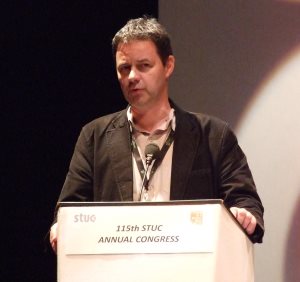Constitutional debate not about powers but what
we do with them
 |
“The answer to all these
questions is not a flag, a border or even
a list of powers in Edinburgh and London.
It is what you intend to do with these
powers and for what purpose”
Stephen Smellie
|
As the STUC sets out on a historic
campaign to engage working people in the debate
on the future of Scotland, it should not be about
what powers politicians want, but about “what
they want to do with those powers”, UNISON’s
Stephen Smellie told Congress this morning.
He welcomed the first minister’s
call for union members’ questions on independence
but the first of those should be “How would
we create a fairer society with lower business taxes
and monetary control with the Bank of England?”
as proposed by the SNP.
“Questions about the status
quo, Devo Max and Devo Plus. Could more devolved
powers allow us to take rail back into public ownership?
Would a constitutional settlement within the UK
guarantee and end to child poverty?”
“The answer to all these questions
is not a flag, a border or even a list of powers
in Edinburgh and London. It is what you intend to
do with these powers and for what purpose”,
Stephen told delegates.
Pat Rafferty of Unite, moving the
motion, reminded the STUC that it won’t be
trade unions or politicians that decide the constitutional
future. “The constitutional issues will be
resolved by the people” and they deserved
as full and wide debate of the kind of Scotland
they want to see.
The question that Scotland will be eventually asked
was ‘too important to be left to politicians’,
said STUC general secretary Grahame Smith, as he
urged politicians to “stop their petty squabbles
and political posturing” and come up with
a clear question for the people of Scotland. “That
last thing we need is a confused result”,
he said. If the politicians can’t decide,
he called for an independent commission to do so.
Roddy Robertson of the Fire Brigades
Union said his union had already been working with
the PCS to engage members in the debate. Organisation
and engagement was needed to make sure members are
aware of all the issues.
Bill Ramsay from South Lanarkshire
and East Kilbride TUC called for ‘straightforward
questions’ of the SNP on ‘industrial
relations, employment, health and safety. We want
direct answers on those and if we get ducking and
diving we’ll know what the real answers are”.
UNISON’s Tommy Morrison, speaking
for Clydebank TUC, said the question was simple
enough, “what does it mean for our people?
Constitutional change in itself will not improve
our members’ position. What will, is democratic
control of accountable public services to stimulate
growth in the economy for everyone”.
ASLEF’s Kevin Lindsay backed
a vote for 16 and 17 year olds but called for that
to be in all votes and elections and not part of
some ‘gerrymandering’ in this one.
It was time for the Scottish Government
to tell us “how independence will give us
social justice”, said Des Loughney from Edinburgh
TUC. The STUC has always had a key role in the major
decisions facing Scotland and how it consults, engages
and eventually decides will have a huge influence
on the vote.
top | STUC
Index |



